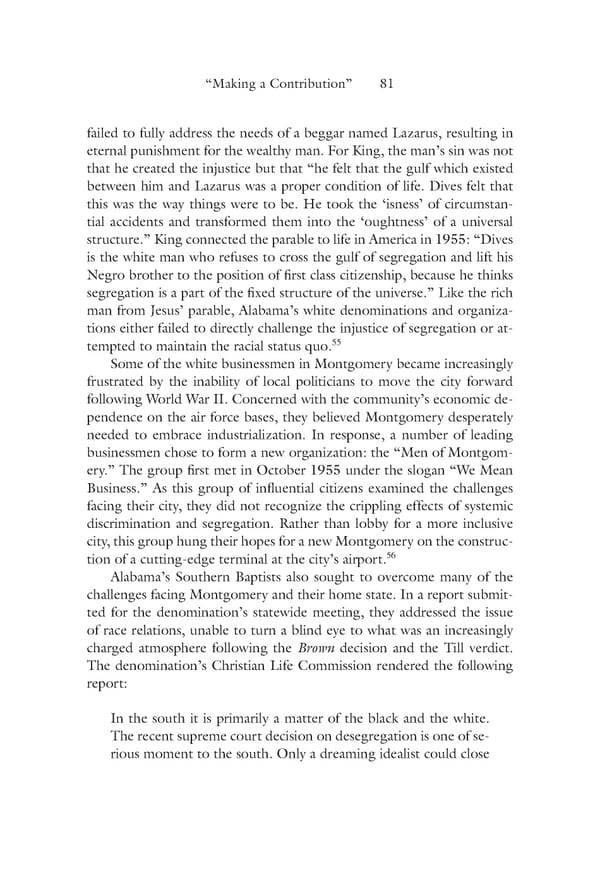“Making a Contribution” 81 failed to fully address the needs of a beggar named Lazarus, resulting in eternal punishment for the wealthy man. For King, the man’s sin was not that he created the injustice but that “he felt that the gulf which existed between him and Lazarus was a proper condition of life. Dives felt that this was the way things were to be. He took the ‘isness’ of circumstan- tial accidents and transformed them into the ‘oughtness’ of a universal structure.” King connected the parable to life in America in 1955: “Dives is the white man who refuses to cross the gulf of segregation and lift his Negro brother to the position of first class citizenship, because he thinks segregation is a part of the fixed structure of the universe.” Like the rich man from Jesus’ parable, Alabama’s white denominations and organiza- tions either failed to directly challenge the injustice of segregation or at- 55 tempted to maintain the racial status quo. Some of the white businessmen in Montgomery became increasingly frustrated by the inability of local politicians to move the city forward following World War II. Concerned with the community’s economic de- pendence on the air force bases, they believed Montgomery desperately needed to embrace industrialization. In response, a number of leading businessmen chose to form a new organization: the “Men of Montgom- ery.” The group first met in October 1955 under the slogan “We Mean Business.” As this group of influential citizens examined the challenges facing their city, they did not recognize the crippling effects of systemic discrimination and segregation. Rather than lobby for a more inclusive city, this group hung their hopes for a new Montgomery on the construc- 56 tion of a cutting-edge terminal at the city’s airport. Alabama’s Southern Baptists also sought to overcome many of the challenges facing Montgomery and their home state. In a report submit- ted for the denomination’s statewide meeting, they addressed the issue of race relations, unable to turn a blind eye to what was an increasingly charged atmosphere following the Brown decision and the Till verdict. The denomination’s Christian Life Commission rendered the following report: In the south it is primarily a matter of the black and the white. The recent supreme court decision on desegregation is one of se- rious moment to the south. Only a dreaming idealist could close
 Becoming King: Martin Luther King Jr. Page 101 Page 103
Becoming King: Martin Luther King Jr. Page 101 Page 103